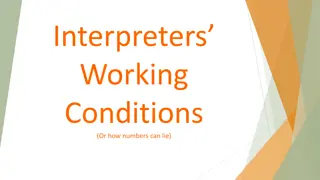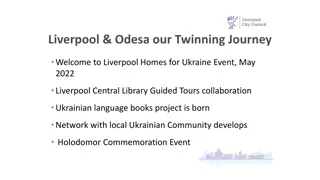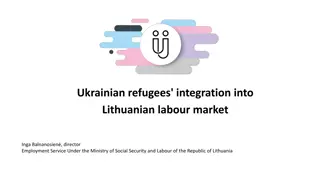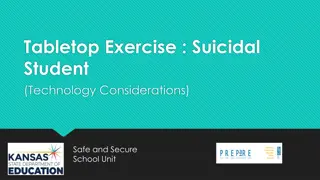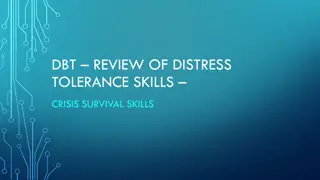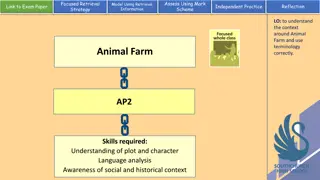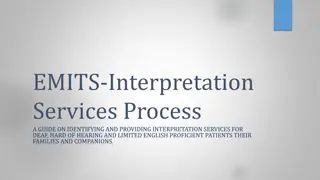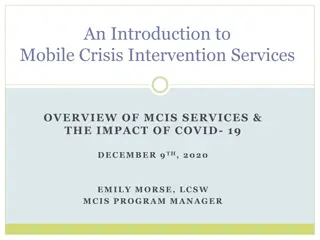Guidelines for Working with Ukrainian and Russian Interpreters in Crisis: Insights from Dr. V. Byrne
Amid the Ukraine crisis, Dr. V. Byrne of Cork Kerry Social Inclusion Psychology Services provides practical guidelines for health workers on effectively working with Ukrainian and Russian speaking interpreters. The focus is on recognizing cultural nuances, understanding the challenges faced by displaced individuals, and promoting social inclusion in healthcare settings.
Download Presentation

Please find below an Image/Link to download the presentation.
The content on the website is provided AS IS for your information and personal use only. It may not be sold, licensed, or shared on other websites without obtaining consent from the author. Download presentation by click this link. If you encounter any issues during the download, it is possible that the publisher has removed the file from their server.
E N D
Presentation Transcript
Working with Ukrainian and Russian Speaking Interpreters: Guidelines for health workers in the midst of the current crisis in Ukraine Dr. V. Byrne, Cork Kerry Social Inclusion Psychology Services
With sincere thanks to our colleagues across the HSE Migrant Psychology Network and in the Woodfield Trauma Service. Dr. V. Byrne, Cork Kerry Social Inclusion Psychology Services
Hello! Dr Veronica Byrne, Senior Psychologist, with Cork Kerry Social Inclusion Psychology Service. veronica.byrne1@hse.ie 086 813 7269 Our service supports refugees living across Cork and Kerry and people seeking asylum or International Protection. Social Inclusion: Recognising that not everyone has the same access to or ability to engage with health and social services. Dr. V. Byrne, Cork Kerry Social Inclusion Psychology Services
Roadmap for today: How do I know when to work with an Interpreter? Practical guidelines for working with Interpreters. Lived experience of working as an Interpreter Understanding the Cultural Context of Ukraine. Dr. V. Byrne, Cork Kerry Social Inclusion Psychology Services
Setting the scene 645,500 people living in Ireland are non-Irish nationals, one in eight people or almost 13% of the population In addition to the barrier of language other differences can make it hard for people from non-Irish backgrounds to know about and know how to access our health services successfully. Dr. V. Byrne, Cork Kerry Social Inclusion Psychology Services
Ukraine Crisis 8 million forcibly displaced people within Ukraine and 5 million people have fled to other countries for safety. Currently 5,500 forcibly displaced people from Ukraine living across Cork and Kerry Dr. V. Byrne, Cork Kerry Social Inclusion Psychology Services
Assessing and understanding a persons challenges is reliant on gathering accurate and meaningful information from clients The way that symptoms, emotions, and patterns of behaviour come across can vary depending on whether a person is using their first or second language. Dr. V. Byrne, Cork Kerry Social Inclusion Psychology Services
Dr. V. Byrne, Cork Kerry Social Inclusion Psychology Services
What is an Interpreter? Is this different to a Translator? Dr. V. Byrne, Cork Kerry Social Inclusion Psychology Services
Why use an interpreter? To overcome language barriers for our clients whose mother tongue is not English To understanding for all people involved. ensure better communication and To help clients feel more comfortable Dr. V. Byrne, Cork Kerry Social Inclusion Psychology Services
Working with Interpreters Any prior experience of working with an interpreter? It can be daunting at first to work with an interpreter- this is normal! Practical tips and considerations to support better outcomes for our clients. Dr. V. Byrne, Cork Kerry Social Inclusion Psychology Services
Before your appointment Dr. V. Byrne, Cork Kerry Social Inclusion Psychology Services
1. When to use an Interpreter Keep in mind that even if your client has reasonably good spoken information and unfamiliar ideas can be hard to explain and to understand. English new Interpretation can add a helpful layer of understanding of cultural differences*. Dr. V. Byrne, Cork Kerry Social Inclusion Psychology Services
1. When to use an Interpreter Interpretation can also reduce anxiety for a person and help them to feel more empowered. Any personal or difficult information can be upsetting to talk about. What can support this person s ability to communicate in this case? Practical considerations: Does my service referral form include a question about interpretation for clients? Dr. V. Byrne, Cork Kerry Social Inclusion Psychology Services
2. Choosing an Interpreter What is your client s preferred language? Does your client speak other languages comfortably? Have you considered the dialect your client speaks? Gender of the interpreter Keep in mind the political landscape that may have contributed to your client having to flee their Country. Dr. V. Byrne, Cork Kerry Social Inclusion Psychology Services
2. Choosing an interpreter It is better to ask if you are unsure. Dr. V. Byrne, Cork Kerry Social Inclusion Psychology Services
3. Do NOT rely on children, family or friends to act as an Interpreter. Just because they can does not mean they should. Think of your client: This makes it very hard for them to honestly answer questions or to share personal or upsetting information. Dr. V. Byrne, Cork Kerry Social Inclusion Psychology Services
3. Do NOT rely on children, family or friends to act as an Interpreter. Think of the young person you are asking to interpret: This can place children in the role of adults and expose them traumatising information. This can also change the dynamic in the family between children and adults and cause further anxiety. to distressing and Dr. V. Byrne, Cork Kerry Social Inclusion Psychology Services
4. Give yourself more time: Working through Interpretation takes more time to arrange, and more time to convey information during your appointment. 5. Keep it simple: How can you let the client know when, where and why you are meeting? Dr. V. Byrne, Cork Kerry Social Inclusion Psychology Services
During Your Appointment Dr. V. Byrne, Cork Kerry Social Inclusion Psychology Services
6. What type of interpretation will I use? Interpretation is available over the phone, via video call and face to face. 7. Help to empower your client in working with the Interpreter. In many cases clients might be anxious about working with Interpreters. Worries around information being talked about outside of the session or shared with others are common. Dr. V. Byrne, Cork Kerry Social Inclusion Psychology Services
7. Help to build your clients trust in the Interpreter Clients may worry that the Interpreter might be upset, shocked or judgemental about details shared. Having clear guidelines for everyone involved in the meeting can help to manage these concerns; Dr. V. Byrne, Cork Kerry Social Inclusion Psychology Services
7. Helping to build trust: Explain why you are working with an Interpreter. Be really clear about confidentiality and explain that the Interpreter cannot share personal information outside of the session. Everything that is said will be translated This is a working relationship- no other relationship between client and Interpreter is advised. (e.g. no conversations before or after meeting). shared transport, no Dr. V. Byrne, Cork Kerry Social Inclusion Psychology Services
8. Before your meeting: Allow for extra time to meet with your Interpreter alone to briefly set out the goals for the session, to explain any concepts/ tools you will use and to prepare them if they will be hearing difficult information. 9. Introductions: Invite the Interpreter to introduce themselves at the start of the meeting to explain why they are here. Dr. V. Byrne, Cork Kerry Social Inclusion Psychology Services
10. Seating arrangements: Set up the seats (if face to face) in a way that lets you keep eye contact with the person you are meeting. When you are talking to this person, direct your eye contact to them. 11. Watch your language: Speak slowly, be direct, don t use jargon, give information in small chunks. Repeat important information and consider using pictures and drawings to further support information. Dr. V. Byrne, Cork Kerry Social Inclusion Psychology Services
12. Ask the Interpreter to translate everything that is said, line by line. This is really important, especially when collecting medical information or when a client is engaging with intervention/ therapy. The Interpreter is asked to say I am tired instead of paraphrasing; he says he is really tired. Golden Rule! Dr. V. Byrne, Cork Kerry Social Inclusion Psychology Services
13. Cultural Context Ask your interpreter to explain if there is contextual or cultural information that would help you or your client to understand better. Be clear that everyone is kept informed of what is being discussed. Dr. V. Byrne, Cork Kerry Social Inclusion Psychology Services
14. Stick to the role: Its important for the Interpreter to remain composed and respectful. It is not their role to advise, judge, comfort or comment. This can be really hard for caring people. 15. Check that the information is being understood. Be careful when using translated versions of standardised tools. Dr. V. Byrne, Cork Kerry Social Inclusion Psychology Services
After your Appointment Dr. V. Byrne, Cork Kerry Social Inclusion Psychology Services
17: Check in with the Interpreter It is helpful to have some time alone with the Interpreter at the end of the session to allow them to discuss any possible upset from what was discussed, to clarify information or to make plans for the next session. If the Interpreter and client are working well together, try to keep this consistent.(*Check in with your client ) Dr. V. Byrne, Cork Kerry Social Inclusion Psychology Services
18. Overcoming Barriers Consider any and every other way that your service can make communication and/service delivery more accessible for clients. Make time to listen to and to address any concerns that your client may have. Dr. V. Byrne, Cork Kerry Social Inclusion Psychology Services
19. Trauma Informed Approach Taking a trauma informed approach in communicating with both your client and the Interpreter. Vicarious trauma is real and can happen to anyone. Dr. V. Byrne, Cork Kerry Social Inclusion Psychology Services
Lived experience of working as a Ukrainian and Russian Interpreter really intense a great experience People don t feel comfortable sharing emotional information with someone who doesn t speak their language I think I can cope with it myself Dr. V. Byrne, Cork Kerry Social Inclusion Psychology Services
Dr. V. Byrne, Cork Kerry Social Inclusion Psychology Services
Terrible Stories Dr. V. Byrne, Cork Kerry Social Inclusion Psychology Services
Cultural Considerations I d like to emphasize that there are 44 million people in Ukraine, of different ethnicities and different religions. As you know, I am a refugee myself, and I am in touch with many Ukrainians at the moment, I can assure you that people who arrive here have a cultural shock. Indeed, Ireland welcomed us with open arms and hearts, and it might seem like Ukrainians have no words to express their gratitude enough Dr. V. Byrne, Cork Kerry Social Inclusion Psychology Services
Dr. V. Byrne, Cork Kerry Social Inclusion Psychology Services
Ukrainians live in a country where everyday life is often unpredictable and unstable, and they have learned to adapt to constantly changing rules and laws. A long history of turbulent economic times, unstable governments, and adverse climatic conditions produce a rather fatalistic approach towards life. Dr. V. Byrne, Cork Kerry Social Inclusion Psychology Services
The help of the government was always minor in Ukraine. Therefore, we can hardly accept such tremendous help, and we are so grateful and fascinated by how welcoming Ireland is. Dr. V. Byrne, Cork Kerry Social Inclusion Psychology Services
Comparison - Irish people are extremely polite and kind. Our people are too, but we do not express it to the whole world to that extent. We tend to keep things inside (unless you are my best friend or family member). We tend to stay strong , no matter what. Some people might refuse help because we are all good . Very straight-forward, bold and sometimes it might seem like we are less polite and just doing everything to achieve the goals Dr. V. Byrne, Cork Kerry Social Inclusion Psychology Services
Further Reading Rachel Tribe & Kate Thompson (2022) Working with interpreters in mental health, International Review of Psychiatry, DOI: 10.1080/09540261.2022.20732 02 Dr. V. Byrne, Cork Kerry Social Inclusion Psychology Services
Further Reading 'Ardenne, P., Farmer, E., Ruaro, L., & Priebe, S. (2007). Not lost in translation: Protocols for interpreting trauma-focused CBT. Behavioural and Cognitive Psychotherapy, 35(3), 303 316. https://doi.org/10.1017/S1352465807003591 Tribe, R. (2007) Working with interpreters , The Psychologist 20 (3) 159-161 Link to published version: http://www.thepsychologist.org.uk/archive/archive_ho me.cfm?volumeID=20&e Dr. V. Byrne, Cork Kerry Social Inclusion Psychology Services
Further Reading Brisset C, Leanza Y, Laforest K. Working with interpreters in health care: a systematic review and meta-ethnography of qualitative studies. Patient Educ Couns. 2013 May;91(2):131-40. doi: 10.1016/j.pec.2012.11.008. Epub 2012 Dec 13. PMID: 23246426. Dr. V. Byrne, Cork Kerry Social Inclusion Psychology Services
Remember to give it time, working in a new way will feel clumsy at first. Dr. V. Byrne, Cork Kerry Social Inclusion Psychology Services
Dr. V. Byrne, Cork Kerry Social Inclusion Psychology Services







